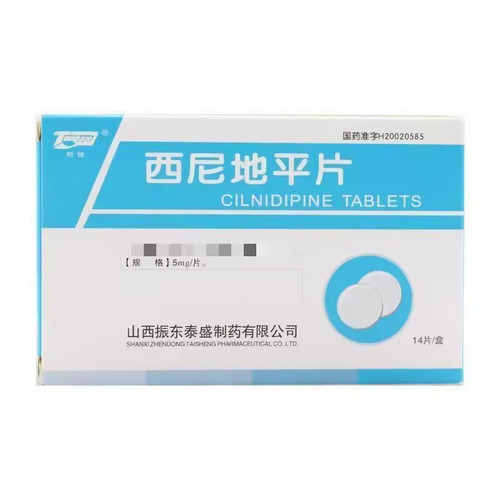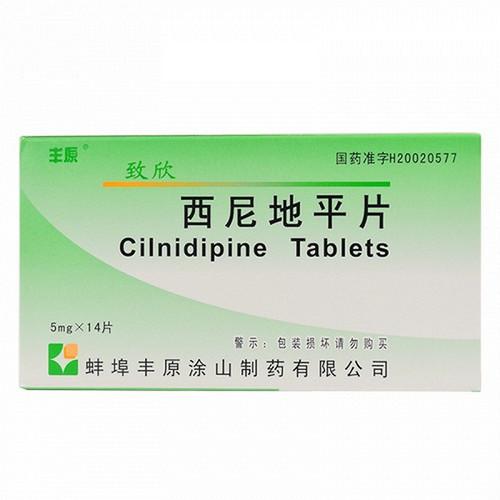Product Overview
[Drug Name]
Generic Name: Cilnidipine Tablets
Trade Name: Xin Ya Li Pu
English Name: Cilnidipine Tablets
Chinese Pinyin: Xi Ni Di Ping Pian
[Ingredients]
Cilnidipine.
[Properties]
This product is a pale yellow tablet.
[Indications]
For the treatment of hypertension.
[Dosage and Administration]
The initial dose for adults is 5 mg (one tablet) once daily after breakfast. The dose may be increased based on the patient's clinical response, up to a maximum of 10 mg (two tablets) once daily after breakfast.
[Adverse Reactions]
Urinary System: Frequent urination, increased uric acid, creatine, and uric acid nitrogen, positive urine protein, positive urine sediment; Nervous System: Headache, dizziness, shoulder muscle stiffness, drowsiness, insomnia, hand tremors, and forgetfulness; Circulatory System: Flushing, palpitations, hot flashes, electrocardiogram abnormalities (ST segment depression, T wave reversal), hypotension, chest pain, chills, premature contractions, and sexual dysfunction; Digestive System: Liver function abnormalities such as increased AST, ALT, and γ-GTP, vomiting, abdominal pain, thirst, constipation, and abdominal distension; Hematological System: Abnormal white blood cell count, neutrophil count, thrombocytopenia, abnormal red blood cell count, hematocrit, eosinophils, and lymphocytes; Allergic Reactions: Drug rash and pruritus; Other: Edema, fatigue, increased serum cholesterol, abnormal serum K and P levels, dry eyes, congestion, gastrocnemius cramps, abnormal taste, positive urine glucose, and abnormal fasting blood glucose, total protein, serum calcium, and CRP.
[Contraindications]
This product is contraindicated in patients with allergies to any of the ingredients.
[Precautions]
Elderly patients should be started with a low dose and their response to treatment should be carefully monitored. When used in combination with digoxin, close attention should be paid to digoxin toxicity. Cilnidipine should be used with caution in patients with hepatic impairment, as plasma concentrations of cilnidipine may increase. Cilnidipine is metabolized in the liver, so caution should be exercised when used concomitantly with the following medications: - Drugs that inhibit the CYP3A4 isoenzyme, such as cimetidine, ketoconazole, itraconazole, erythromycin, HIV protease inhibitors, and fluoxetine - CYP3A4 isoenzyme inducers, such as phenytoin, carbamazepine, and rifampicin - Drugs metabolized by the CYP3A4 isoenzyme, such as cyclosporine - Drugs that inhibit or induce the CYP2C19 isoenzyme - Drugs metabolized by the CYP2C19 isoenzyme, such as S-mephenytoin and omeprazole. Grape juice can increase cilnidipine plasma concentrations, so these two medications should not be used concomitantly. Women of childbearing age should use contraceptive measures during treatment. Use with caution in patients with congestive heart failure. Calcium channel blockers are not recommended for the following conditions: - Unstable angina - Myocardial infarction within the past month - Left ventricular outflow tract obstruction - Untreated congestive heart failure. Use with caution in patients with a history of serious adverse reactions to calcium channel blockers. Symptoms of sore throat may worsen at the start of treatment or when increasing the dose. Use with caution in patients with chronic renal insufficiency. Use with caution when combined with beta-blockers, especially in those with left ventricular dysfunction. During fentanyl anesthesia, it is recommended to discontinue nifedipine and other dihydropyridine derivatives 36 hours before surgery. Because sudden discontinuation of calcium channel blockers may worsen the condition, the dose should be gradually reduced and symptoms should be fully observed before discontinuation. When the dose is reduced to 5 mg, alternative medications should be used. Discontinuation of medication should be performed under the guidance of a physician. Please read the package insert carefully and use according to your physician's instructions.
[Use in Special Populations]
Precautions for Children:
There are no data available for the use of this product in children and it is not recommended for use in children. Precautions for Pregnancy and Lactation:
Pregnant women should not use this product (animal studies have shown it to be toxic to the fetus and may cause miscarriage). Because this product is secreted through breast milk, lactating women should avoid its use. If this cannot be avoided, breastfeeding should be discontinued.
Precautions for Elderly People:
Not yet known.
[Drug Interactions]
Drug interactions may occur if used concurrently with other medications. Please consult your physician or pharmacist for details.
[Pharmacological Actions]
This product is a lipophilic dihydropyridine calcium antagonist. It binds to the dihydropyridine site of the L-type calcium channel on the vascular smooth muscle cell membrane, inhibiting the transmembrane influx of Ca2+ through the L-type calcium channel, thereby relaxing and dilating vascular smooth muscle and exerting a hypotensive effect. It also inhibits the release of norepinephrine from sympathetic nerve endings and sympathetic nerve activity by inhibiting the transmembrane influx of Ca2+ through the N-type calcium channel on the sympathetic nerve cell membrane.
[Storage] Store in a sealed container away from light.
[Strength] 5mg
[Packaging] Double aluminum packaging, 10 tablets/box
[Expiration Date] 24 months
[Approval Number] National Medicine Standard H20080668
[Manufacturer] Company Name: Shanghai Xinya Pharmaceutical Minhang Co., Ltd.







